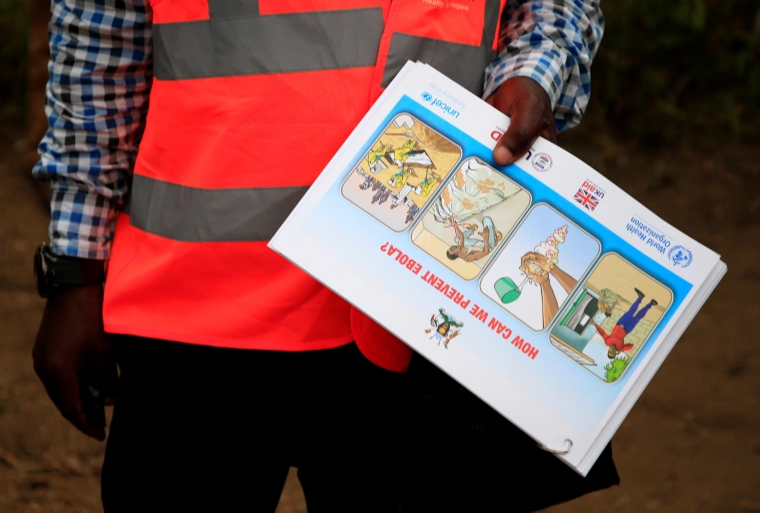
A Ugandan health worker shows an informational flyer on Ebola virus and how to prevent its spread to the community of Kirembo village, near the border with the Democratic Republic of Congo, in Kasese district, Uganda REUTERS/James Akena
Kampala, September 21 (RHC)-- An outbreak of Ebola has been declared in Uganda after health authorities confirmed a case of the relatively rare Sudan strain, the government and the World Health Organization (WHO) said. “We want to inform the country that we have an outbreak of Ebola, which we confirmed yesterday,” Diana Atwine, the health ministry’s permanent secretary, told a news conference on Tuesday.
The patient with the confirmed case, a 24-year-old man in Uganda’s central Mubende district, showed symptoms and later died. Atwine said the man had a high fever, diarrhoea and abdominal pains and was vomiting blood. He had initially been treated for malaria.
There are currently eight suspected cases receiving care in a health facility, the WHO’s Africa office said in a statement, adding that it was helping Uganda’s health authorities with their investigation and deploying staff to the affected area.
“Uganda is no stranger to effective Ebola control. Thanks to its expertise, action has been taken to quickly detect the virus, and we can bank on this knowledge to halt the spread of infections,” Matshidiso Moeti, the WHO Africa’s regional director, said. The WHO said there had been seven previous outbreaks of the Ebola Sudan strain, four in Uganda and three in Sudan.
Case fatality rates of the Sudan virus have varied from 41 percent to 100 percent in past outbreaks, the global health agency added. It noted ring vaccination of high-risk people with the Ervebo vaccine had been highly effective in controlling the spread of Ebola in recent outbreaks in the Democratic Republic of the Congo (DRC) and elsewhere but that this vaccine had only been approved to protect against the Zaire strain.
First identified in 1976 in the DRC (then Zaire), the virus, whose natural host is the bat, has since set off a series of epidemics in Africa, killing some 15,000 people. Human transmission is through body fluids, with the main symptoms being fever, vomiting, bleeding and diarrhoea. Outbreaks are difficult to contain, especially in urban environments.

